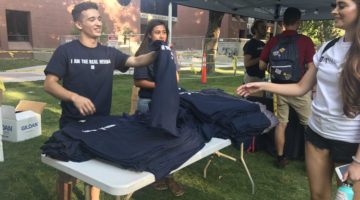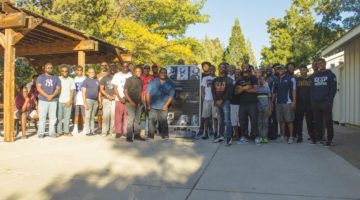
Noor Tagouri interacting the audience who attended the 2019 Northern Nevada Diversity Summit on Thursday, April 11. Noor Tagouri was one of the main speakers at the event and discussed her experiences with diversity in the field of journalism.
Libyan-American journalist Noor Tagouri spoke at the sixth-annual Northern Nevada Diversity Summit on Thursday, April 11, at the Joe Crowley Student Union.
The goal of the NNDS was to present challenges to unity in the world, propose potential solutions to these challenges and create a space to facilitate these conversations.
“The Summit is important because it allows attendees to explore and learn different topics that are often not discussed on a day-to-day basis; it encourages meaningful and respectful conversations,” Graduate Assistant of Diversity Initiatives Matthew Aguirre said in an email to the Nevada Sagebrush. “The day of the Summit serves as a place for attendees to learn and explore different views, experiences and backgrounds. The learning and exploration can range from topics such as mental health, LGBTQIA+ experiences, privilege, immigration, gender inequality, ability/disability, and many more.”
Activist Noor Tagouri was one of the main speakers at the event. Tagouri shared her beginnings in the journalism industry, as well as how she got her start in activism.
A first-generation American, Tagouri grew up in a small conservative town in West Virginia. As a child, she loved to tell stories and ask questions, but never planned on becoming a journalist. As she got older, she realized she had a bigger job than telling stories, but rather wanted to shed light on certain subjects. When Tagouri was working for a media outlet, she pitched a story about the mistreatment of individuals with mental disabilities. It was rumored the medical institution had graffiti on the walls and private medical documents found on the floors of the building. Her news editor declined the pitch. As a result, Tagouri quit and reported the story herself, creating her first documentary in 2015, “The Trouble They’ve Seen: The Forest Haven Story”. This project motivated her to tell more stories.
“Most people typically focus on our differences,” Tagouri said. “People take a lot of exercises jumping to conclusions. I like to think about the ways we can use our differences to build those bridges and commonality and their stories. There is this lack of understanding. There is this lack of community..and I recognized that the second I would able to sit and connect to someone through their story, through their experiences, I was able to see people in a completely different light.”
Tagouri launched a campaign in 2015 “#LetNoorShine” after trying to attempt to be the first news anchor wearing a hijab. In 2017, Tagouri released a series on Hulu called “A Woman’s Job”, which highlighted strong women in male-dominated fields. In 2018, Tagouri released her documentary series called “Sold in America”, which discussed sex trafficking in the U.S. Tagouri has also been featured in South by Southwest Festivals, TEDx, Create and Cultivate and New York Fashion Week.
“I had done [“The Trouble They’ve Seen: The Forest Haven Story”] to serve as a piece a justice for the community and when I was in journalism school, all my professors were older white men and they did not have the exact experiences that I had about what it was like to be misrepresented in the media,” Tagouri said. “I taught myself to go into stories asking: how’s the way I’m going to cover this going to impact the communities that we’re talking about?”
Tagouri believes the university can facilitate conversations of diversity to students, faculty and the community who have concerns. She feels by amplifying and validating the voices of students who do not feel safe on campus, the university will begin to diversify itself. Diversity should not just be on the “surface level”, according to Tagouri.
“Well, first of all, diversity is, among many things, about a context; that is, how diversity is understood, how it is experienced, what issues become particularly relevant, etc. has absolutely to do with the context,” Diversity and Inclusion Officer Dr. Gordon-Mora said in an email to the Nevada Sagebrush. “This is the case because diversity encompasses such richness of identities, core areas, issues that it is not inhabited in the same way across different environments. UNR’s immediate environment is, of course, the Northern Nevada region, and therefore, it is utterly important to be carrying out these conversations, as the summit has been doing for the past six years, to strengthen understandings and co-existence, ‘to build bridges’, as this year’s theme establishes.”
The event was sponsored by the university, the Associated Students of the University of Nevada, Truckee Meadows Community College, JCSU, the Desert Research Institute, Western Nevada College and Great Basin College Parking.
“…[U]niversity students do not live in a campus vacuum, or at least, most certainly, ought not,” Gordon-Mora said. “Unfortunately, residential universities in the United States have had a historical tendency for intramural existence, that is, ‘inside the walls’. However, a critical part of learning and life experiences is about the surrounding communities, outside the university: both the students and the communities have much to learn from one another. It is, therefore, highly commendable that UNR and the region engage in these events. In the case of UNR, I see it as part of our mission that recognizes: “the importance of diversity in preparing students for global citizenship and its commitment to a culture of excellence, inclusion and accessibility.”
The NNDS was organized by the university’s Cultural Diversity Committee. The CDC was created in spring 2013 after the Multi-Ethnic Coalition and Alliance of Racial Minorities merged. The CDC aims to promote the creation of culturally aware students, faculty and staff.
“ASUN has teamed up with the CDC and sponsored the diversity summit speaker to help provide an educational experience for students, faculty, and community members,” ASUN Director of Diversity and Inclusion Arezo Amerzada said in an email to the Nevada Sagebrush. “Our campus benefits greatly from learning from each other and learning from those who have different experiences than us. The diversity summit speaker is an opportunity to bring someone that has made an impact on their community and share their experience to inspire and ignite change with within our community as well.”
Aguirre encourages students to attend lectures and take classes by experts focusing on a diversity-related topic to learn how to be an ally to marginalized populations. Some of the events Aguirre mentioned some events will be featured during Indigenous Heritage Month, Black History Month, Disability Awareness Month, Pride Month, Latinx Heritage Month and more at the university.
Taylor Johnson can be reached at tjohnson@sagebrush.unr.edu or on Twitter @NevadaSagebrush.











